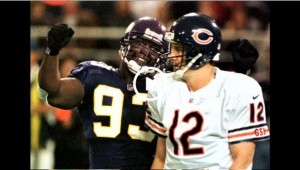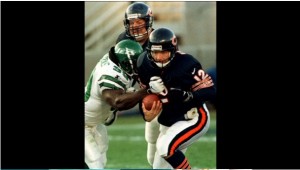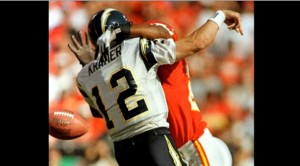 AUGUST 21 (Reuters) Former National Football League quarterback Erik Kramer tried to commit suicide by shooting himself at a motel in the Los Angeles area, NBC News reported.
AUGUST 21 (Reuters) Former National Football League quarterback Erik Kramer tried to commit suicide by shooting himself at a motel in the Los Angeles area, NBC News reported.
Kramer’s former wife, Marshawn Kramer, told NBC News late on Wednesday (August 19) that he suffered from depression, which she thought was linked to his playing days in what could be another case of a retired player being plagued by head injuries after retirement. She could not be reached for further comment.
Los Angeles County Sheriff’s Department spokeswoman Deputy Crystal Hernandez on Thursday (August 20) confirmed deputies went to check on a man on Tuesday night at a motel in Calabasas and found he had a gunshot wound from an apparent suicide attempt. She declined to release the man’s name due to patient confidentiality rules but NBC News identified him as Kramer, 50, citing unnamed law enforcement sources and Marshawn Kramer.
He was taken by helicopter to a hospital with a non-life threatening injury.
Kramer played for the Atlanta Falcons, Detroit Lions, Chicago Bears and San Diego Chargers between 1987 and 1999. His best season was 1995 with the Chicago Bears when he passed for 3,838 yards and 29 touchdowns.
Kramer and his ex-wife have a 17-year-old son and Marshawn Kramer told NBC News, “He’s such a good dad and he would not do this to his son. This is brain injury.”
 In the past decade, the families of some NFL players who committed suicide, including stars Junior Seau in 2012 and Dave Duerson in 2011, have blamed their deaths on brain injuries. A study of Seau’s brain revealed he suffered from chronic traumatic encephalopathy, a debilitating condition caused by jolts to the head that can lead to aggression and dementia.
In the past decade, the families of some NFL players who committed suicide, including stars Junior Seau in 2012 and Dave Duerson in 2011, have blamed their deaths on brain injuries. A study of Seau’s brain revealed he suffered from chronic traumatic encephalopathy, a debilitating condition caused by jolts to the head that can lead to aggression and dementia.
Research linking collisions on the field to the disease has already prompted the NFL to make changes, including requiring teams to keep players who have taken hits to the head off the field if they show certain symptoms.
League officials earlier this year negotiated a potential $1 billion settlement of lawsuits by retired players who say the league hid the risk of concussions. Some former players this month have objected to the settlement, saying it would not properly treat players yet to be diagnosed with CTE.






